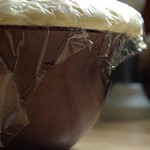17 Jul, 2015
Attempted bird rescue (Alternate title: what not to do when you find a crow on your lawn.)
Posted by andrea tomkins in: Misc. life
We were at my in-laws on a hot day last week when we were alerted to the fact that there was a crow hopping around the front lawn. Correction, it was hobbling, in a rather ungraceful kind of way. So of course, being the bird nerds that we are, we had to investigate. Turns out it was a juvenile, you can tell by the blue eyes:
He was a little rough around the edges, that was for sure, and we quickly found out why… there were burrs in his underfeathers, which was probably making life really uncomfortable for him. Mark picked him up and we removed the burrs. It was hot, and he looked pretty thirsty (basically, he was hanging around with his mouth open), so we filled a small bowl with water and placed it in front of him. He wasn’t really drinking – and we weren’t sure if it was because of the bowl – so we got a paper towel, dipped it in the water, and wrung a few drops into his mouth. He seemed to like that.
Not pictured: the little bits of cherry and bits of dog kibble we offered up as a snack. After awhile Junior decided the water dish wasn’t so bad. In fact, it was a rather comfortable place to sit:
Afterwards Mark looked up some info about baby crows, and found out some good information which I thought might be useful to share here.
1) If you find a young crow hopping around the ground, don’t worry, this is just a natural state of things. The fact that they’re staggering around like a drunken sailor doesn’t necessarily mean they’re injured, they’re just not great at walking. Like many birds (robins, for example), young crows will leave the nest before they are able to get a good grip on flying. This seems counter-intuitive, but the nest is really just a cradle, not a playpen for young birds. This one just happened to land in a bunch of burrs on the way down.
2) Juvenile crows know well enough to hide in the bushes away from predators, such as household cats. Its parents are probably keeping an eye on it, if not the parents, other adult crows, because crows have complex social structures and look out for one another.
3) This is why calling animal control is a bad idea. Your intent is good, but ultimately you’re removing the crow from its home and family. It’s best just to leave them alone.
So what happened to our baby crow? It eventually hopped away. We heard adult crows cawing in the distance, and spotted a family of three sitting on a lamp post nearby. Hopefully, keeping a watchful eye on the youngest member of their flock.






